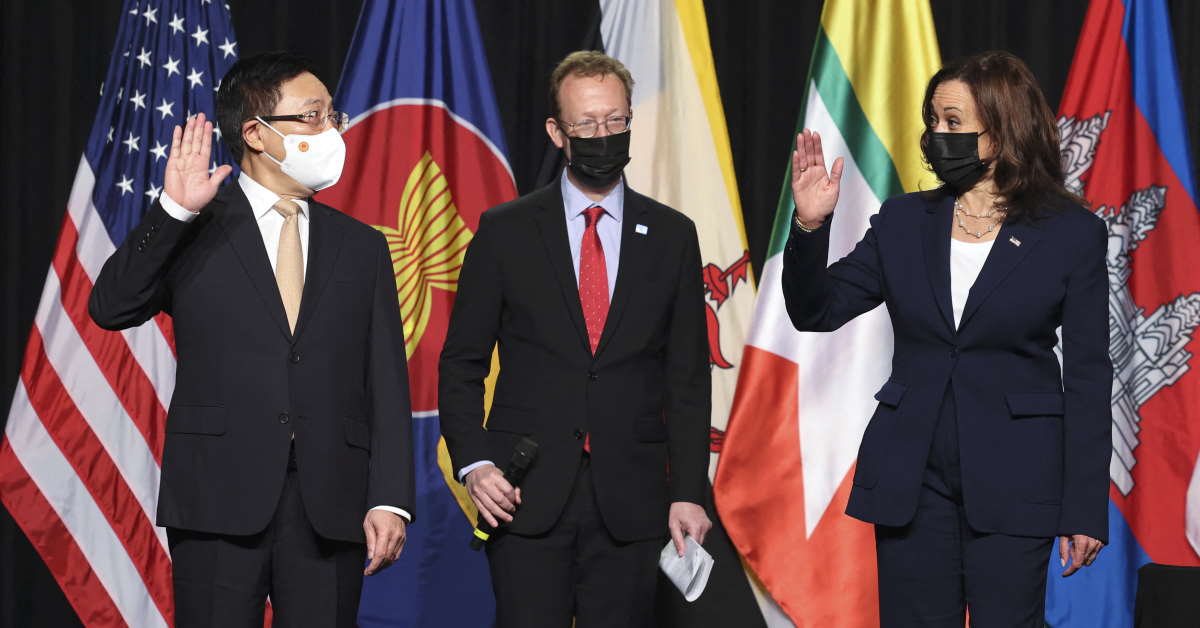Vice President Kamala Harris said Wednesday the United States (US) would find new ways to "raise the pressure on Beijing", accusing China of bullying in hotly disputed Asian waters for the second time in two days.
Harris made the comments as she began a visit to Vietnam to stress US commitment to Asia, a trip that critics have slammed as tone-deaf given the parallels with the superpower's evacuations from Saigon and Kabul.
During a meeting with Vietnam President Nguyen Xuan Phuc, Harris said the US would continue to challenge Beijing's "bullying and excessive maritime claims" in the South China Sea.
"We need to find ways to pressure and raise the pressure, frankly, on Beijing to abide by the United Nations Convention on the Law of the Sea," she added.
During the Singapore leg of her regional trip Tuesday, Harris also accused China of intimidation in the resource-rich waterway.
China hit back at the accusations through its state media on Wednesday, accusing the US of hypocrisy in attempting to "coerce and intimidate" countries in the region in its "scheme to contain China".
Anomalous Health Incident
Harris' arrival in Vietnam was delayed due to what US officials called an "anomalous health incident" in Hanoi, an apparent reference to the so-called "Havana syndrome" which has afflicted US diplomats in several countries including China and Russia.
It is not clear what causes the syndrome, leading to unproven allegations that Russians or others used high-intensity electronic devices to physically harm US diplomats.
The Vietnam leg of the Asian tour has sparked criticism after the chaotic evacuation of Kabul prompted comparisons with the trauma of 1975 Saigon, when US helicopters ferried final evacuees from the embassy roof in the last days of the Vietnam War.
Harris is steering clear of both Saigon – now Ho Chi Minh City – and the historical parallels, instead emphasising Washington's commitment to the region as she opened a branch of the US Centers for Disease Control (CDC) in Hanoi.
The launch was a symbol of the US's "enduring relationship with Vietnam and Southeast Asia", she told President Phuc.
On Wednesday, Harris said a donation of one million Pfizer vaccines would begin arriving in Vietnam in the next 24 hours from the US – which has already sent five million doses to the country.
She later visited late US senator John McCain's memorial during a downpour in the capital, laying flowers at the site where his plane was shot down by the North Vietnamese on the third anniversary of his death.
China 'Intimidation'
In Singapore, Harris said Beijing "continues to coerce, to intimidate" and make unreasonable claims to large areas of the South China Sea.
Four Southeast Asian states including Vietnam have competing claims over the waterway through which trillions of dollars in shipping trade passes annually.
China has been accused of deploying military hardware including anti-ship and surface-to-air missiles there, and ignored a 2016 international tribunal decision that rejected its historical claim over most of the waters.
Harris is the latest top official from President Joe Biden's team to visit the region to reassure allies of its steadfastness.
But events in Afghanistan have cast doubts on Washington's claims of reliability.
Pham Quang Vinh, Vietnam's former ambassador to the United States, said the country was watching events in Kabul closely.
"The US has recommitted itself now to this region but if something happens in Afghanistan again, for example if terrorism comes back... will the US continue to focus here?" he said.
In Singapore, Harris sought to allay fears that countries that have strong ties with both of the world's top economies would have to choose sides.
Vietnam has sought to forge its own path between the two superpowers and on Tuesday Prime Minister Pham Minh Chinh met the Chinese ambassador, stressing Hanoi would not "align with one country against another". – AFP
